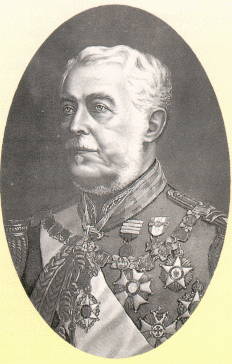 On February 25, 1845, the
leaders of the Farroupilha Revolution defeated in the battlefields by the imperial troops
headed by Field Marshall Luís Alves de Lima e Silva - Baron of Caxias signed the Peace of
Ponche Verde. That was the end of a fight among brothers which bloodbathed the noble
"gaucho' soil for around ten years.
On February 25, 1845, the
leaders of the Farroupilha Revolution defeated in the battlefields by the imperial troops
headed by Field Marshall Luís Alves de Lima e Silva - Baron of Caxias signed the Peace of
Ponche Verde. That was the end of a fight among brothers which bloodbathed the noble
"gaucho' soil for around ten years.
Political divergences between local leaderships and the Regent Government that was
established in Brazil with the Abdication of D. Pedro I, added to economic problems
resulted from the production and trade of jerked beef have triggered the rebellion.
The revolutionary uprising has been going on for seven years when the nation finally
reached out for his right man: Marshall Luís Alves de Lima e Silva, successful
pacificator of the provinces of Maranhão, São Paulo and Minas Gerais. Nominated as
Commandant-in-Arms, the Baron of Caxias renown by this remarkable military competence and
rooted on deep conciliatory spirit started on November 9,1842 his pacificatory mission.
Caxias faced with determination the revolted farroupilhas that were skilled in the art
of making war in the "pampas" and in the "coxilhas". Thanks to his
capacity of celebrated nhilitary chief he defeated them progressively until the Fight of
Porongos, when the farroupilhas were incontestably overthrown.
Instead of treading upon the defeated, Caxias worked for their amnesty, for the respect
to the private property, and for the incorporation of the farrapos leaders to the Imperial
Army in the same posts they held.
From this page of our military story raises the distinguished figure of Marshall Luís
Alves de Lima e Silva, future Duke of Caxias, Patron of the Brazilian Army.
No dia 25 de fevereiro de 1845, os chefes da Revolução Farroupilha, derrotados nos
campos de batalha pelas tropas imperiais comandadas pelo Marechal-de-campo Graduado Luís
Alves de Lima e Silva, Barão de Caxias, assinavam a Paz de Ponche Verde. Terminava,
assim, uma luta entre irmãos que ensangüentara a nobre terra gaúcha por cerca de dez
anos.
Divergências políticas entre lideranças locais e o Governa Regencial que se
instalara no Brasil com a Abdicação de D. Pedro I, aliadas a problemas econômicos
decorrentes da produção e comercialização do charque, deflagraram a rebelião.
A agitação revolucionária já perdurava há sete anos, quando a Nação foi buscar o
seu homem providencial: a Marechal Luís Alves de Lima e Silva, aureolado pela
pacificação das províncias do Maranhão, de São Paulo e de Minas Gerais. Nomeado
Presidente da Província e Comandante das Armas, o Barão de Caxias, respaldado em
notável competência militar e imbuído de arraigado espírita conciliador, iniciava em 9
de novembro de 1842 sua missão pacificadora.
Caxias enfrentou com determinação os revoltosos farroupilhas, hábeis na arte de
fazer a guerra nos pampas e nas coxilhas. Mercê de sua autoridade de chefe militar já
consagrado, derrotou-os progressivamente até o Combate de Porongos, no qual os
farroupilhas foram irremediavelmente batidos.
Ao invés de tripudiar sobre os vencidos, Caxias empenhou-se pela concessão da anistia
aos rebeldes, pela respeito à propriedade privada, pela incorporação dos chefes
farrapos ao Exército Imperial, com os mesmos postos que detinham. Dessa página épica de
nossa história militar aflora a figura insigne do Marechal Luís Alves de Lima e Silva,
futuro Duque de Caxias e, hoje, Patrono do Exército Brasileiro.